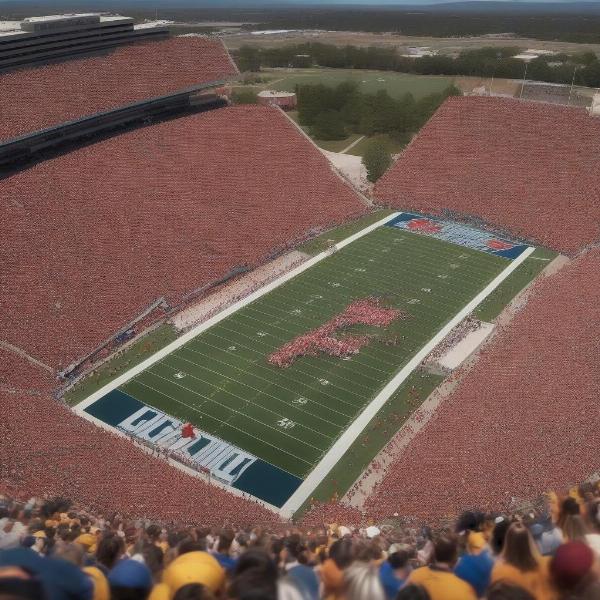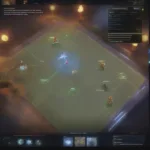The homecoming game is a cherished tradition in many high schools and colleges across North America. It’s more than just a football game; it’s a celebration of school spirit, alumni connections, and community pride. But what exactly makes it so special? Let’s delve into the heart of this vibrant tradition and uncover what makes the homecoming game a truly unique experience.
Understanding the Significance of Homecoming
Homecoming is a time-honored tradition that brings together current students, alumni, faculty, and the local community. It’s a chance for past graduates to reconnect with their alma mater, reminisce about their school days, and celebrate the institution’s shared history. The homecoming game, typically a football game, serves as the centerpiece of this week-long celebration. The atmosphere is electric, filled with cheering crowds, spirited chants, and the thrill of competition. More than a sporting event, it’s a symbol of unity and pride.
The History and Evolution of Homecoming
While the exact origins are debated, homecoming likely started in the early 20th century with universities encouraging alumni to “come home” for a major football game. Over time, this tradition spread to high schools and evolved to include a variety of festivities, such as parades, pep rallies, dances, and crowning of a homecoming king and queen. The homecoming game remains the highlight of the week, providing a focal point for shared enthusiasm and school spirit.
The Key Elements of a Homecoming Game
The homecoming game is characterized by several distinctive elements. The vibrant atmosphere is palpable, with students and alumni dressed in school colors, waving banners, and cheering enthusiastically. Halftime shows often feature marching bands, student performances, and the crowning of the homecoming court. Tailgating before the game is a popular tradition, allowing friends and families to gather and enjoy the festive atmosphere. These elements create a unique experience that goes beyond the typical sporting event.
 Homecoming Game Crowd Cheering Enthusiastically
Homecoming Game Crowd Cheering Enthusiastically
The Cultural Impact of Homecoming
The homecoming game holds a significant cultural impact, reinforcing community bonds and fostering a sense of belonging. It provides an opportunity for alumni to reconnect with their roots, share memories, and contribute to the school’s continued success. For current students, it strengthens school spirit, creates lasting memories, and promotes a sense of pride in their institution.
Homecoming and Community Building
Homecoming week isn’t just about the game; it’s about bringing the entire community together. Local businesses often participate in the festivities, and the event can generate significant economic activity for the surrounding area. The shared experience of celebrating the school and its traditions strengthens community bonds and creates a sense of collective identity.
Homecoming: A Celebration of School Spirit
The homecoming game is a powerful expression of school spirit. Students, alumni, and faculty come together to celebrate their shared affiliation and express their pride in the institution. This shared enthusiasm creates a vibrant and memorable experience for everyone involved.
Beyond the Game: Other Homecoming Traditions
While the game is the central event, homecoming week is filled with various other traditions that contribute to the overall celebratory atmosphere. Parades, pep rallies, dances, and alumni gatherings are common occurrences, providing opportunities for the entire community to participate and connect.
The Homecoming Parade: A Spectacle of School Pride
The homecoming parade is a vibrant procession through the town or campus, showcasing school spirit and community pride. Floats, marching bands, student groups, and local organizations participate, creating a colorful and exciting spectacle for onlookers.
The Homecoming Dance: A Night of Celebration
The homecoming dance is a formal or semi-formal event held after the game, providing students and alumni with a chance to socialize and celebrate. It’s a night filled with music, dancing, and creating lasting memories.
 Homecoming Dance with Students Celebrating
Homecoming Dance with Students Celebrating
Conclusion: The Enduring Appeal of the Homecoming Game
The homecoming game is more than just a sporting event; it’s a cherished tradition that celebrates school spirit, alumni connections, and community pride. From the electric atmosphere of the game to the various surrounding festivities, homecoming creates a unique and memorable experience for everyone involved. It’s a reminder of the power of shared traditions and the importance of community in shaping our identities. So, the next time you hear about a homecoming game, remember that it’s about more than just the final score; it’s about coming home to celebrate the spirit and legacy of an institution.
FAQ
- What is the purpose of a homecoming game? To celebrate school spirit, reconnect alumni with their alma mater, and foster community pride.
- When do homecoming games usually take place? Typically in the fall, often during September or October.
- What are some common homecoming traditions besides the game? Parades, pep rallies, dances, and alumni gatherings.
- Who is crowned at the homecoming game? The homecoming king and queen, chosen by student vote.
- Why is homecoming important to alumni? It offers a chance to reconnect with their past, relive memories, and contribute to their school’s future.
- How can I get involved in homecoming activities? Check your school’s website or contact the alumni association for information on events and volunteer opportunities.
- What should I wear to a homecoming game? School colors are encouraged! Comfortable clothing suitable for the weather is recommended.

